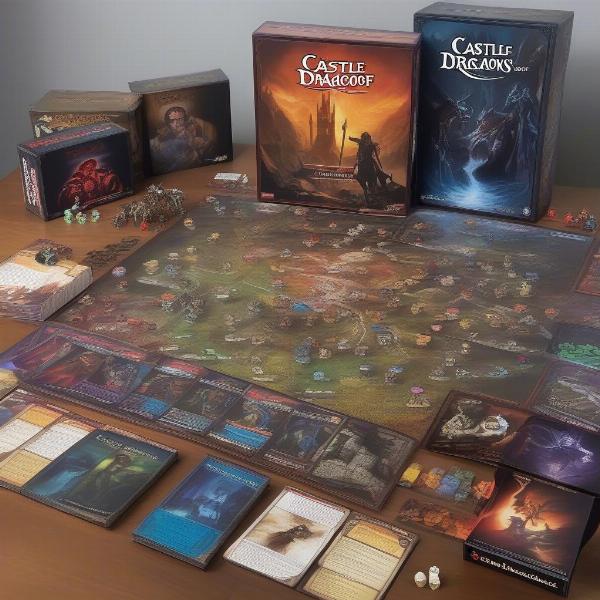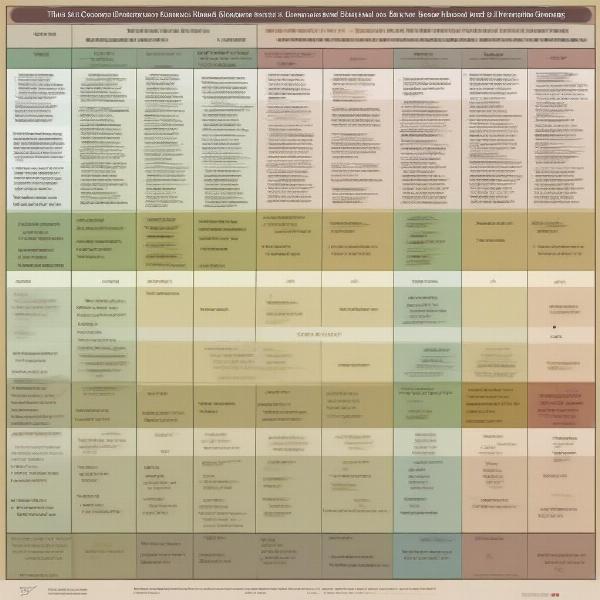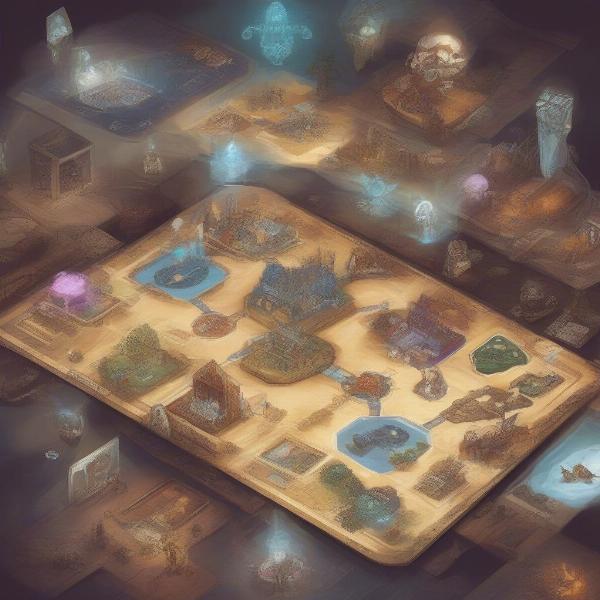Dungeons & Dragons board games have exploded in popularity, offering a captivating blend of strategy, storytelling, and the iconic D&D universe. This comprehensive guide dives deep into the world of D&D board games, exploring different types, popular titles, and everything you need to know before embarking on your next adventure.
For those seeking a more streamlined D&D experience, consider exploring the dungeons & dragons adventure system board game. It offers a great entry point into the world of D&D tabletop gaming.
What are Dungeons and Dragons Board Games?
Dungeons & Dragons board games are tabletop games that capture the essence of the legendary role-playing game (RPG) in a more accessible, self-contained format. Unlike the traditional pen-and-paper RPG, board games often feature pre-written adventures, simplified rules, and strategic gameplay mechanics. They cater to a wider range of players, including those new to the D&D world and veterans looking for a different kind of challenge. These games can be cooperative, competitive, or a mix of both, offering diverse gameplay experiences.
Popular Dungeons and Dragons Board Games
The market offers a plethora of D&D board games, each with its own unique features and mechanics. Here are some of the most popular titles:
- Dungeons & Dragons: Castle Ravenloft: This classic adventure game throws players into the gothic horror of Ravenloft Castle, facing off against terrifying creatures and solving challenging puzzles. It’s a great choice for players seeking a challenging, immersive experience.
- Dungeons & Dragons: Wrath of Ashardalon: A cooperative dungeon crawl where players work together to defeat the fearsome dragon Ashardalon. Its tile-laying mechanics and tactical combat make it a thrilling experience for groups.
- Dungeons & Dragons: The Legend of Drizzt: This adventure game focuses on the iconic character Drizzt Do’Urden, allowing players to relive his adventures in the Underdark. It offers a unique blend of exploration and combat.
- Dungeons & Dragons: Temple of Elemental Evil: A more complex and strategic game that throws players into a sprawling dungeon, filled with deadly traps and powerful monsters. It’s suitable for experienced board game players.
 A Diverse Collection of Dungeons & Dragons Board Games
A Diverse Collection of Dungeons & Dragons Board Games
Choosing the Right Dungeons and Dragons Board Game for You
With so many options available, choosing the right D&D board game can seem daunting. To help you narrow down your choices, consider the following factors:
- Number of Players: Some games are designed for solo play, while others require a larger group.
- Complexity: Games range from simple, introductory-level experiences to complex, strategic challenges.
- Game Length: Consider how much time you’re willing to dedicate to a single game.
- Theme: D&D offers various themes, from high fantasy to gothic horror. Choose a theme that resonates with your interests.
How to Play Dungeons and Dragons Board Games: A Beginner’s Guide
Most D&D board games follow a similar basic structure:
- Setup: Arrange the game board, cards, tokens, and miniatures according to the game’s instructions.
- Character Selection: Choose your character(s), each with unique abilities and stats.
- Gameplay: Players take turns moving their characters around the game board, exploring dungeons, battling monsters, and completing objectives.
- Combat: Combat is often resolved using dice rolls and character stats.
- Victory Conditions: The game ends when the players achieve a specific objective, such as defeating a boss monster or reaching a certain location on the game board.
What are the differences between Dungeons & Dragons RPG and Board Games?
While both share the D&D universe and offer adventures, they differ significantly in gameplay:
-
RPGs (Role-Playing Games): Highly narrative-driven, rely on improvisation and storytelling, require a Dungeon Master (DM), offer immense replayability, and can be very time-consuming.
-
Board Games: More structured gameplay, pre-determined adventures, limited player agency compared to RPGs, usually shorter playtime, and offer a quick and engaging D&D experience.
 Comparing D&D RPG and Board Game Experiences
Comparing D&D RPG and Board Game Experiences
Beyond the Basics: Advanced Dungeons and Dragons Board Game Strategies
For experienced players, mastering advanced strategies can significantly improve your chances of success. These might include:
- Understanding Character Synergies: In cooperative games, carefully selecting characters with complementary abilities is key.
- Optimizing Resource Management: Efficiently managing resources like health potions and spells can be crucial in challenging encounters.
- Mastering Combat Tactics: Learning to position your characters strategically and utilizing special abilities effectively can turn the tide of battle.
The Future of Dungeons and Dragons Board Games
The popularity of D&D board games continues to grow, with new titles constantly emerging. Expect to see even more innovative mechanics, immersive themes, and exciting adventures in the future. The developers are constantly striving to improve the experience, introducing new expansions and standalone games, guaranteeing that the fun will never cease.
 Emerging Trends in Dungeons & Dragons Board Games
Emerging Trends in Dungeons & Dragons Board Games
“The beauty of D&D board games lies in their accessibility,” comments renowned game designer, Dr. Elara Vance. “They provide a fantastic gateway to the world of D&D for new players, while still offering a deep and rewarding experience for veterans.”
“Moreover,” adds Professor Gareth Blackwood, a leading expert on fantasy literature, “the board games successfully translate the epic narrative and thrilling combat of D&D into a more compact and readily available format. It’s a testament to their clever design.”
“The evolving landscape of D&D board games reflects the constant evolution of the industry, responding to players’ changing preferences and expectations while staying true to the core values of the RPG,” concludes Amelia Stone, a respected industry analyst.
Frequently Asked Questions (FAQs)
Q1: Are Dungeons & Dragons board games difficult to learn?
A1: Not at all! Many D&D board games are designed to be accessible to beginners, with straightforward rules and tutorials.
Q2: How long do D&D board games typically take to play?
A2: This varies widely, from 30 minutes to several hours, depending on the complexity and length of the chosen adventure.
Q3: Can I play D&D board games solo?
A3: Some D&D board games are designed for solo play, while others require multiple players. Check the game’s specifications before purchasing.
Q4: What age range are D&D board games suitable for?
A4: This depends on the specific game, with some designed for younger players while others are more challenging and better suited for older audiences. Check the age recommendation on the box.
Q5: Where can I buy Dungeons & Dragons board games?
A5: You can find D&D board games at most major game stores, online retailers, and even some bookstores.
Q6: Are there expansions for D&D board games?
A6: Yes, many D&D board games have expansions that add new content, such as characters, monsters, and scenarios, increasing replayability and variety.
Q7: Do I need to know the D&D RPG to enjoy D&D board games?
A7: No, prior knowledge of the D&D RPG isn’t necessary to enjoy the board games. The games are designed to be self-contained and accessible even to newcomers.
Ready to start your D&D board game adventure? Share your favorite games and experiences in the comments below!

